九年级英语Unit13《We27retryingtosavetheearth!》知识点.doc
- 格式:doc
- 大小:209.52 KB
- 文档页数:9
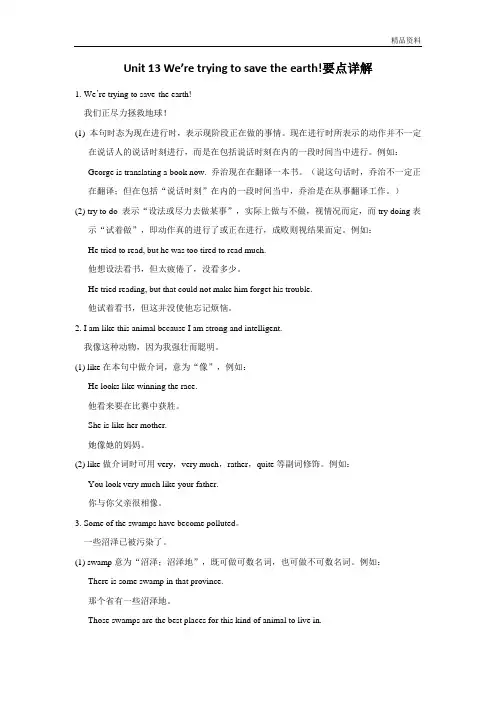
Unit 13 We’re trying to save the earth!要点详解1. We’re trying to save the earth!我们正尽力拯救地球!(1) 本句时态为现在进行时,表示现阶段正在做的事情。
现在进行时所表示的动作并不一定在说话人的说话时刻进行,而是在包括说话时刻在内的一段时间当中进行。
例如:George is translating a book now. 乔治现在在翻译一本书。
(说这句话时,乔治不一定正在翻译;但在包括“说话时刻”在内的一段时间当中,乔治是在从事翻译工作。
)(2) try to do 表示“设法或尽力去做某事”,实际上做与不做,视情况而定,而try doing表示“试着做”,即动作真的进行了或正在进行,成败则视结果而定。
例如:He tried to read, but he was too tired to read much.他想设法看书,但太疲倦了,没看多少。
He tried reading, but that could not make him forget his trouble.他试着看书,但这并没使他忘记烦恼。
2. I am like this animal because I am strong and intelligent.我像这种动物,因为我强壮而聪明。
(1) like在本句中做介词,意为“像”,例如:He looks like winning the race.他看来要在比赛中获胜。
She is like her mother.她像她的妈妈。
(2) like做介词时可用very,very much,rather,quite等副词修饰。
例如:You look very much like your father.你与你父亲很相像。
3. Some of the swamps have become polluted。
一些沼泽已被污染了。
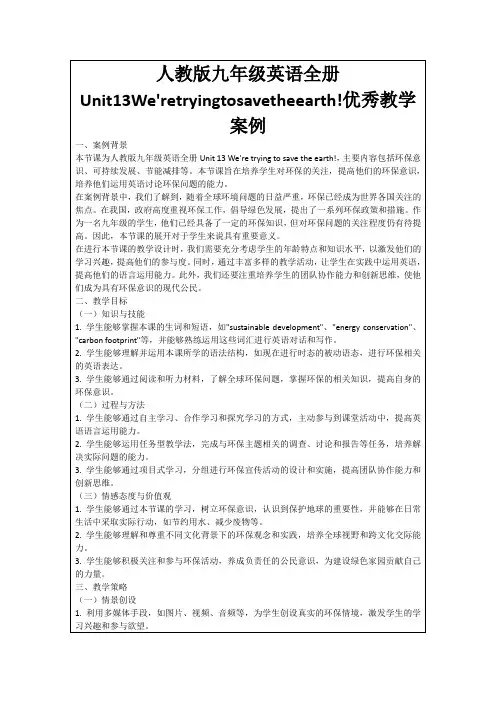
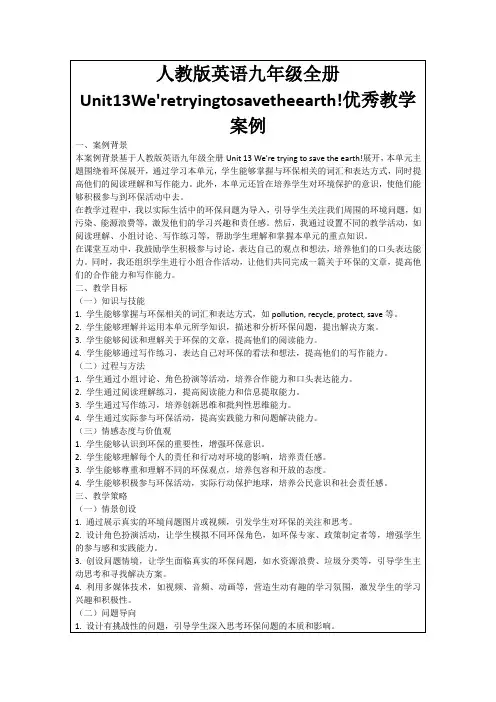
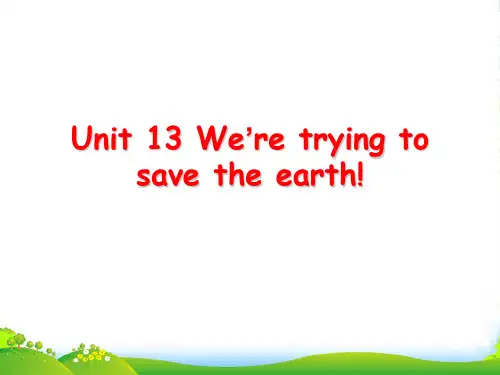
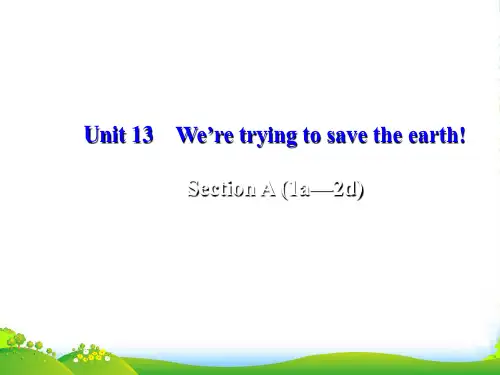
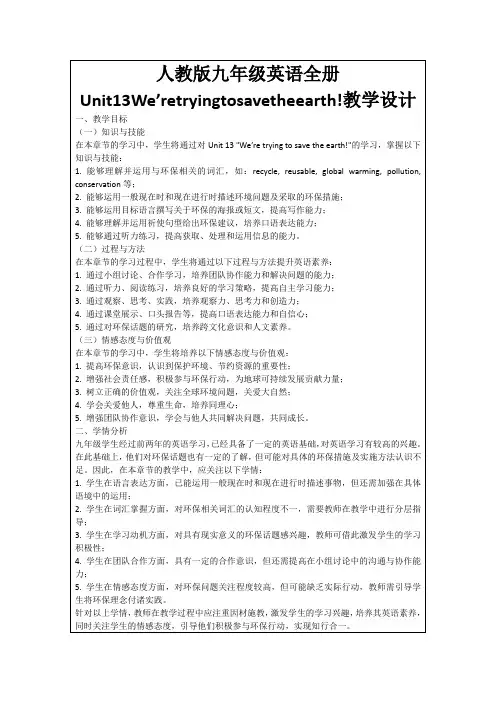
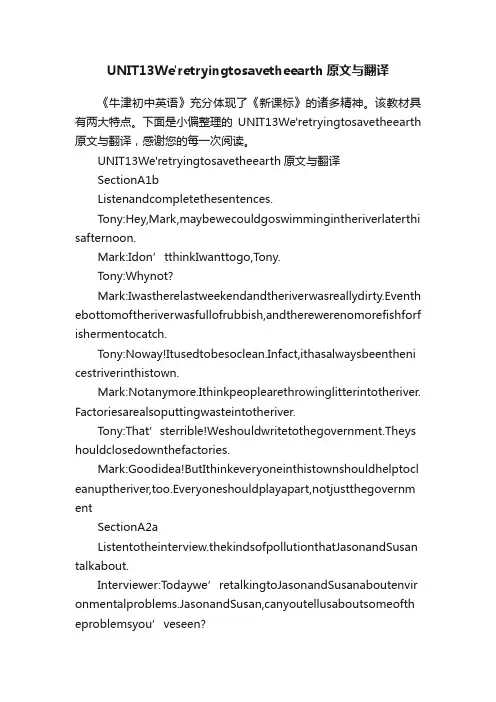
UNIT13We'retryingtosavetheearth原文与翻译《牛津初中英语》充分体现了《新课标》的诸多精神。
该教材具有两大特点。
下面是小偏整理的UNIT13We'retryingtosavetheearth 原文与翻译,感谢您的每一次阅读。
UNIT13We'retryingtosavetheearth原文与翻译SectionA1bListenandcompletethesentences.Tony:Hey,Mark,maybewecouldgoswimmingintheriverlaterthi safternoon.Mark:Idon’tthinkIwanttogo,Tony.Tony:Whynot?Mark:Iwastherelastweekendandtheriverwasreallydirty.Eventh ebottomoftheriverwasfullofrubbish,andtherewerenomorefishforf ishermentocatch.Tony:Noway!Itusedtobesoclean.Infact,ithasalwaysbeentheni cestriverinthistown.Mark:Notanymore.Ithinkpeoplearethrowinglitterintotheriver. Factoriesarealsoputtingwasteintotheriver.Tony:That’sterrible!Weshouldwritetothegovernment.Theys houldclosedownthefactories.Mark:Goodidea!ButIthinkeveryoneinthistownshouldhelptocl eanuptheriver,too.Everyoneshouldplayapart,notjustthegovernm entSectionA2aListentotheinterview.thekindsofpollutionthatJasonandSusan talkabout.Interviewer:T odaywe’retalkingtoJason andSusanaboutenvir onmentalproblems.JasonandSusan,canyoutellusaboutsomeofth eproblemsyou’veseen?Jason:Ithinkoneproblemisthattheairisbadlypolluted.Ihardlye verseeblueskiesanymore.Susan:Yes,andIusedtoseethestarsclearly.Interviewer:Whatdoyouthinkhascausedthisproblem?Susan:Well,therearemorecarsontheroadthesedays.Jason:Andfactoriesthatburncoalalsopollutetheairwithalotofb lacksmoke.Interviewer:Whatotherproblemsdoyousee?Susan:Iguessthere’stoomuchrubbishandwasteinthestreets.Jason:Yes!Everydaypeoplearethrowingawaythingslikewoode nchopsticks,plasticbowlsandplasticbags.Susan:They’realsolitteringinpublicplaces,forexample,durin gpicnicsinparks.Thisisturningbeautifulplacesintouglyones.Interviewer:You’reright.Theseareseriousproble msforourenv ironment.Next,let’stalkaboutthethingswecandotohelp.SectionA2bListenagainandcompletethesentences.Interviewer:T odaywe’retalkingtoJasonandSusanaboutenvir onmentalproblems.JasonandSusan,canyoutellusaboutsomeofth eproblemsyou’veseen?Jason:Ithinkoneproblemisthattheairisbadlypolluted.Ihardlye verseeblueskiesanymore.Susan:Yes,andIusedtoseethestarsclearly.Interviewer:Whatdoyouthinkhascausedthisproblem?Susan:Well,therearemorecarsontheroadthesedays.Jason:Andfactoriesthatburncoalalsopollutetheairwithalotofb lacksmoke.Interviewer:Whatotherproblemsdoyousee?Susan:Iguessthere’stoomuchrubbishandwasteinthestreets.Jason:Yes!Everydaypeoplearethrowingawaythingslikewoodenchopsticks,plasticbowlsandplasticbags.Susan:They’realsolitteringinpublicplaces,forexample,d urin gpicnicsinparks.Thisisturningbeautifulplacesintouglyones.Interviewer:You’reright.Theseareseriousproblemsforourenv ironment.Next,let’stalkaboutthethingswecandotohelp.SectionA2dRoleplaytheconversation.JasonandSusan,whatareyourideasforsolvingtheseproblems?Well,tocutdownairpollution,weshouldtakethebusorsubwayin steadofdriving.Yeah,orrideabike.Thereareotheradvantagesofbikeriding.It'sg oodforhealthitdoesn'tanythingGreatideas!Whataboutwastepollution?Mmm,Ithinksimplethingslikebringingabagtogoshoppingcan help.Istarteddoingthatayearago.Me,tooAlso,Inevertakewoodenchopsticksorplasticforkswhen Ibuytakeawayfood.Iusetheonesathome.Andremembertothrowrubbishinthebinsandkeeppublicplace scleanandbeautifulforeveryone.Sotogether,ouractionscanmakeadifferenceandleadtoabetter future!SectionA3aReadthepassageaboutsharksandcompletethefactsheetbelow.SavetheSharks!Manyhaveheardofsharkfinsoup.Thisfamousandexpensivedis hisespeciallypopularinsouthernChina.Butdoyourealizethaty ou’r ekillingawholesharkeachtimeyouenjoyabowlofsharkfinsoup?Whenpeoplecatchsharks,theycutofftheirfinsandthrowthesha rkbackintotheocean.Thisisnotonlycruel,butalsoharmfultotheenvir onment.Withoutafin,asharkcannolongerswimandslowlydies.Sharksar eatthetopofthefo odchainintheocean’secosystem.Iftheirnumber sdroptoolow,itwillbringdangertoalloceanlife.Manybelievethatsharkscanneverbeendangeredbecausethey arethestrongestintheirfoodchain.Butinfact,around70millionshark sarecaughtandtradedinthisindustryeveryyear.Thenumbersofsomekindsofsharkshavefallenbyover90percen tinthelast20to30years.Environmentalprotectiongroupsaroundthe world,suchasWildAidandtheWWF,areteachingthepublicabout“fi nning”.Theyhaveevenaskedgovernmentstodeveloplawstostopthesal eofsharkfins.Sofar,noscientificstudieshaveshownthatsharkfinsare goodforhealth,sowhyeatthem?Helpsavethesharks!SectionB1cListenandcheck(√)thethingsthatJuliaandJacktalkabout.Jack:Turnoffthelights,Julia.Itsaveselectricity.Julia:Oh,Iusuallydothat.Iwasjustinahurry.Jack:Isee.I’vejustreadabookwh ichgivesideasabouthowweca nsavetheenvironment.Forexample,youshouldturnofftheshowerw henyou’rewashingyourhair.Julia:Oh,Iwouldneverdothat.Ihaveveryshorthair.Itonlytakesaf ewminutestowash.Whatelsedoesitsay?Jack:Youshouldtakeyourownbagswhenyougoshopping.Julia:Oh,that’seasy.I’lldothatfromnowon.Whatelse?Jack:Peopleshouldstopridingincarsandstartridingbikes.Julia:Noway!Itwouldtakeme45minutestogettoschoolbybike!Jack:Butit’sgoodfortheenvironment!Besides,Ilikeridingmybi ke.Julia:Yes,andyoualsoliveclosetoschool!SectionB1dListenagain.Check(√)thethingsthatJuliaisdoingnow,thethings shewilldointhefutureandthethingsshewouldneverdo.Jack:Turnoffthelights,Julia.Itsaveselectricity.Julia:Oh,Iusuallydothat.Iwasjustinahurry.Jack:Isee.I’vejustreadabookwhichgiveside asabouthowweca nsavetheenvironment.Forexample,youshouldturnofftheshowerw henyou’rewashingyourhair.Julia:Oh,Iwouldneverdothat.Ihaveveryshorthair.Itonlytakesaf ewminutestowash.Whatelsedoesitsay?Jack:Youshouldtakeyourownbagswhenyougoshopping.Julia:Oh,that’seasy.I’lldothatfromnowon.Whatelse?Jack:Peopleshouldstopridingincarsandstartridingbikes.Julia:Noway!Itwouldtakeme45minutestogettoschoolbybike!Jack:Butit’sgoodfortheenvironment!Besides,Ilikeridingmybi ke.Julia:Yes,andyoualsoliveclosetoschool!SectionB2bReadthepassageandcompletethechartbelow.Rethink,Reuse,Recycle!Doyouoftenthrowawaythingsyoudon’tneedanymore?Have youeverthoughtabouthowthesethingscanactuallybeputtogoodu se?Nothingisawasteifyouhaveacreativemind.Youhaveprobablyn everheardofAmyHayes,butsheisamostunusualwoman.Shelivesin ahouseintheUKthatshebuiltherselfoutofrubbish.Thewindowsanddoorscomefromoldbuildingsaroundhertow nthatwerepulleddown.Thetopofthehouseisanoldboatturnedupsi dedown.Andthegateinfrontofherhouseismadeofrocksandoldglas sbottles.AmyrecentlywonaprizefromtheHelpSaveOurPlanetSociety.Thepresidentsaid,“Amyisaninspirationtousall.”Amyisn’ttheonlyonewhoisgoodatrecycling.JessicaWongfro mHongKongusesoldclothesthatpeop ledon’twearanymoretoma kebags.Shehasbeendoingthisforafewyearsnow.Sheopenedasmallshopwhereshesellsherbags,andshehasalso setupawebsitetosellthemonline.Sheespeciallylikestouseoldjeanst omakehandbags.Herbagsarecuteanduseful.“Iplantowriteabookaboutnewwaystouseoldclothes,”shesai d.“Ihopepeoplecanreadmybookandenjoyit!”WangTaosetupasmallbusinessinShanghaifouryearsago.Heisk nownforusingironandothermaterialsfromoldcarstomakebeautifu lartpieces.Somearelargepiecesthatlooklikeanimalsorhumans,and somearesmallerpiecesyoucanputathome.Themorepopularworks canevenbeseeninartshopsaroundthecity.WangTaohopestosetupa“metalart”themeparktoshowpeop letheimportanceofenvironmentalprotection.Notonlycantheartbri nghappinesstoothers,butitalsoshowsthatevencold,hardironcanb ebroughtbacktolifewithalittlecreativity.翻译:SectionA2d采访者:贾森和苏珊,对于解决这些问题,你们有什么想法?贾森:为了减少空气污染,我们应该乘坐公共汽车或者地铁,而不是开车。
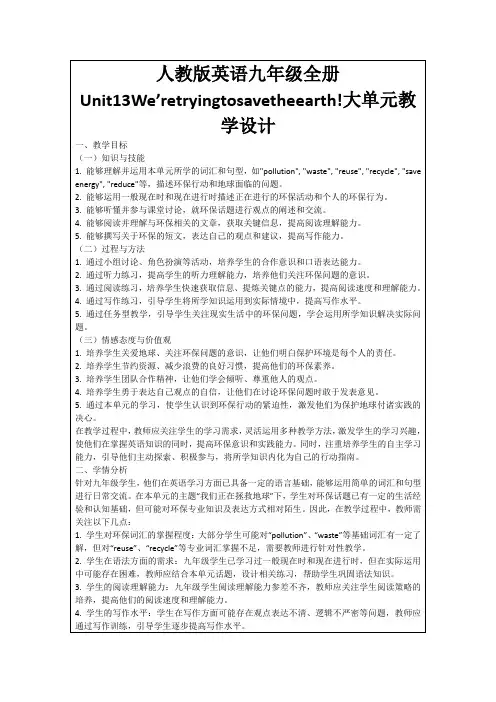
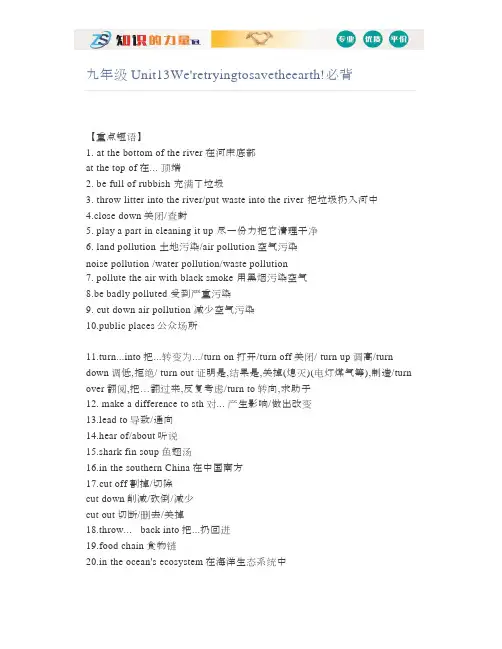
九年级Unit13We'retryingtosavetheearth!必背【重点短语】1. at the bottom of the river在河床底部at the top of在... 顶端2. be full of rubbish 充满了垃圾3. throw litter into the river/put waste into the river 把垃圾扔入河中4.close down关闭/查封5. play a part in cleaning it up 尽一份力把它清理干净6. land pollution 土地污染/air pollution空气污染noise pollution /water pollution/waste pollution7. pollute the air with black smoke 用黑烟污染空气8.be badly polluted 受到严重污染9. cut down air pollution 减少空气污染10.public places公众场所11.turn...into把...转变为.../turn on打开/turn off关闭/ turn up调高/turn down调低,拒绝/ turn out证明是,结果是,关掉(熄灭)(电灯煤气等),制造/turn over翻阅,把…翻过来,反复考虑/turn to转向,求助于12. make a difference to sth对... 产生影响/做出改变13.lead to导致/通向14.hear of/about听说15.shark fin soup鱼翅汤16.in the southern China在中国南方17.cut off割掉/切除cut down削减/砍倒/减少cut out切断/删去/关掉18.throw... back into把...扔回进19.food chain食物链20.in the ocean's ecosystem在海洋生态系统中21.be endangered濒临灭绝22.in this industry在这个行业23.the number of...,... 的数量a number of...,大量的...24.fall/drop by 下降了fall/drop to下降到25.in the last 20 to 30 years在过去的二三十年里26.environmental protection groups环保组织27.teach the public about finning教导公众有关割鳍28.develop laws完善法律29.scientific studies科学研究30. improve the environment改善环境31.take action to do sth.采取行动去做……32.can't afford to wait等不起33.begin with从...开始34.save electricity省电35.turn off the lights关灯36.reusable bags可重复使用的袋子/环保袋37. pay for 付费38. add up累加/合计39.do...instead of doing...做...而不是做...40.stop riding in cars不要开车出行41. use public transportation 使用公共交通42. recycle books and paper 回收书和废纸43. use paper napkins 使用纸巾44. turn off the shower 关掉淋浴/喷头45. rethink, reuse, recycle反思,回收,再利用46.think about考虑47.put...to good use把…很好地利用/充分利用...48.have a creative mind有创造性的思维49.build herself out of rubbish用垃圾建造自己的房子50.pull down拆毁51.turn...upside down把…上下颠倒/倒置52.win a prize获奖53.help save our planet society帮助拯救我们地球社会54.be an inspiration to us all鼓舞了我们所有人55.set up a website建立网站56.art pieces艺术品57. bring back to life使复生/复活58.with a little creativity用一点点创造力【重点句型】1. Even the bottom of the river was full of rubbish. 甚至河底都充满垃圾。
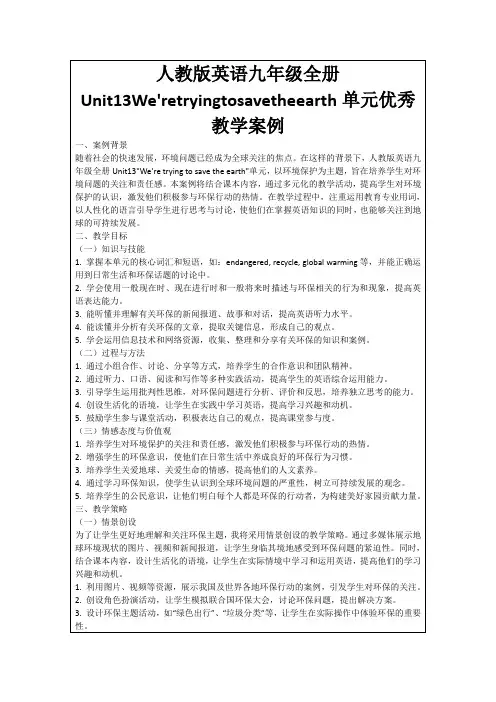
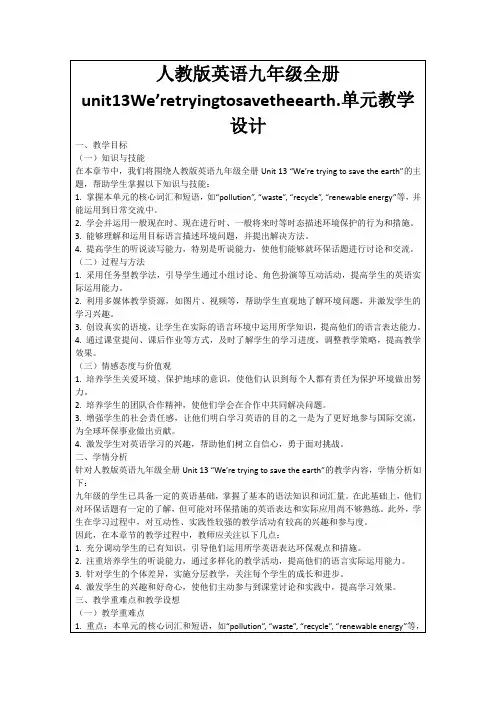
人教版英语九年级Unit 13《We’re trying to save the earth》全单元说课稿一. 教材分析人教版英语九年级Unit 13《We’re trying to save the earth》全单元主要围绕环保主题展开,通过学习本单元,学生能够掌握与环保相关的词汇和表达方式,了解人们为保护地球所采取的行动,提高环保意识。
本单元包括两个阅读文本,分别是关于地球一小时活动和一位美国学生的环保故事。
通过阅读和实践活动,学生能够提高阅读理解能力,培养运用英语进行交流的能力。
二. 学情分析九年级的学生已经具备了一定的英语基础,能够理解和运用一些基本的英语表达。
但他们在阅读理解,尤其是对于长篇阅读材料的理解上还存在一定的困难。
此外,学生对于环保主题的认识和关注程度不同,因此在教学过程中需要引导学生深入思考,提高他们的环保意识。
三. 说教学目标1.知识目标:学生能够掌握本单元的重点词汇和表达方式,理解阅读文本的内容。
2.能力目标:学生能够运用英语进行阅读理解,提高阅读能力;能够运用所学知识进行交流和讨论。
3.情感目标:学生能够增强环保意识,认识到保护地球的重要性。
四. 说教学重难点1.重点:本单元的重点是让学生掌握与环保相关的词汇和表达方式,提高阅读理解能力。
2.难点:学生对于阅读文本的理解和运用所学知识进行交流和讨论。
五. 说教学方法与手段1.教学方法:采用任务型教学法,引导学生通过阅读、讨论、实践活动等方式,提高英语运用能力。
2.教学手段:利用多媒体教学设备,展示相关图片和视频,帮助学生更好地理解文本内容。
六. 说教学过程1.导入:通过展示地球环境的图片,引导学生思考环保问题,激发学生的学习兴趣。
2.阅读理解:学生自主阅读文本,回答相关问题,教师进行讲解和指导。
3.小组讨论:学生分组讨论,分享各自的观点和感受,教师进行巡回指导。
4.实践活动:学生根据所学内容,进行角色扮演或写作练习,教师进行评价和指导。
九年级英语Unit13 ? We27re trying to save the earth!?知识点4 如果句子里面没有时间状语,汉语意思能够加“已经〞,往往用现在完成时态。
Have you lost your library book?你已经弄丢了从图书馆借的那本书吗?5现在完成时态还常常用于以下句型They have planted many trees in the last/past few years.This is the best book I have ever read.在现在完成时中,一次性动词不能和一段时间状语连用例: He has bought the book for 3 years.〔错〕因 buy 这个一次性动词不能和一段时间for 3 years连用,改正的方法有:He has bought the book.(去掉一段时间for 3 years)He bought the book 3 years ago(改为一般过去时, 使句子的意思不变) It ’ s/It has been 3 years since he bo ught the book. = 3 years has passed since he bought the book.〔改为固定句型It is/It has been ---since--- 〕He has had the book for 3 years.〔用延续性动词have 代替 buy 〕另外①〔错〕改为: I have been here for 3 years.②leave/go →be awa yHe has left for 3 hours.〔错〕改为: He has been away for 3 hours.③ begin/start→be onThe film has begun for 3 minutes.〔错〕改为: The film has been on for 3 minutes.④ open →be open / close→ be closedThe shop has opened for 3 years.(错)改为: The shop has been open for 3 years.⑤ die→be deadHis father has died for 3 years.(错)改为: His father has been dead for 3 years.⑥ finish/end→ be overHe has finished the work for 3 days.(错)改为: The work has been over for 3 days⑦ join I have joined the army for 3 years.〔错〕改为: I have been in the army for 3 years.或I have been a soldier for 3 years.⑧ buy /catch→ haveI have bought the bike for 3 years.〔错〕改为: I have had the bike for 3 years.He has caught a cold for 3 days.〔错〕改为: He has had a cold for 3 days.⑨borrow → keepI have borrowed the book for 3 years.〔错〕改为: I have kept the book for 3 years.还有其它的归纳如下:5.情态动词1)情态动词本身有一定的词义 ,表示说话人的情绪、态度或语气 ,但不能单独作谓语 ,只能与其他动词构成谓语。
九年级英语Unit13 《 We27re trying to save the earth!》知识点4 如果句子里面没有时间状语,汉语意思能够加“已经”,往往用现在完成时态。
Have you lost your library book?你已经弄丢了从图书馆借的那本书吗?5现在完成时态还常常用于下列句型They have planted many trees in the last/past few years.This is the best book I have ever read.在现在完成时中,一次性动词不能和一段时间状语连用例: He has bought the book for 3 years.(错)因 buy 这个一次性动词不能和一段时间for 3 years连用,改正的办法有:He has bought the book.(去掉一段时间for 3 years)He bought the book 3 years ago(改为一般过去时, 使句子的意思不变) It ’ s/It has been 3 years since he bo ught the book. = 3 years has passed since he bought the book.(改为固定句型It is/It has been --- since--- )He has had the book for 3 years.(用延续性动词have 代替 buy )另外①(错)改为: I have been here for 3 years.②leave/go →be awa yHe has left for 3 hours.(错)改为: He has been away for 3 hours.③ begin/start→be onThe film has begun for 3 minutes.(错)改为: The film has been on for 3 minutes.④ open →be open / close→ be closedThe shop has opened for 3 years.(错)改为: The shop has been open for 3 years.⑤ die→be deadHis father has died for 3 years.(错)改为: His father has been dead for 3 years.⑥ finish/end→ be overHe has finished the work for 3 days.(错)改为: The work has been over for 3 days⑦ join I have joined the army for 3 years.(错)改为: I have been in the army for 3 years.或I have been a soldier for 3 years.⑧ buy /catch→ haveI have bought the bike for 3 years.(错)改为: I have had the bike for 3 years.He has caught a cold for 3 days.(错)改为: He has had a cold for 3 days.⑨borrow → keepI have borrowed the book for 3 years.(错)改为: I have kept the book for 3 years.还有其它的归纳如下:5.情态动词1)情态动词本身有一定的词义 ,表示说话人的情绪、态度或语气 ,但不能单独作谓语 ,只能与其他动词构成谓语。
常见的有:can (could), may (might), must, need,等。
2)情态动词无人称和数的变化 , 后接动词原形。
否定式是在情态动词后面加not 。
个别情态动词有过去式形式, 也可用来表达更加客气、委婉的语气。
shall (should), will (would)1.can 和 could 的用法(1)can/could 表示“能力;可;可能性”等。
could can 的去式。
如: CanI use your bike?(2)can 用在疑句中 ,表示征求意、求可,答仍用can; could 用在疑句中 ,比 can 更委婉、客气 ,是一种礼貌的法, 并不表示去 ,答用 can, 而不能用 could 。
如:—Could you tell me the way to the zoo? — Sorry. I can't. I'm new here 。
[注意 ] can 和 could 只能用于在和去两种,将来中用 be able to。
另外 , can't 可表示否定推。
如: That ______ be Mr Wang. He has goneto Beijing 。
2.may 和 might 的用法may/might 意“可以”,表示同意、可或求方可,也可表示祝愿。
may 的否定形式may not 。
might 是 may 的去式 ,有两种用法:一种表示去式;一种表示虚气,使气更加委婉、客气,或表示可能性更小。
以may 开的一般疑句 ,其否定回答用mustn't,而不用may not 。
如: ______ I use your pen? 我可以用你用的笔?You may put on more clothes. May you be happy!Might I borrow some money now?He might be alive.3.must 的用法must意“必,一定,准是”,表示人有必要做某事, 或命令、要求人做某事以及事物的推。
否定形式mustn't,表示“不得”一,“定不要”。
如:I ______ finish my work today。
You mustn't drive after drinking。
(1)must 与 have to 的区: must 表示人的主意愿; have to 表示客需要。
如:I must do my homework first。
It is raining hard outside; I _____ stay athome 。
(2)回答由 must 引的疑句的提①肯定回答: Yes, ⋯must. 如:— Must I go home now? — Yes, you must. ②否定回答:No,⋯needn't./No,⋯don't/doesn't have to.— Must I go home now? — No, you __ ____.(3)must 表示事物的推 ,意“想必;一定”,只用于肯定句中;表“推” ,情与原形 ,(常 be )用 ,如: The man must be our teacher 。
4.need 的用法(1)need表示“需要,必”,主要用于否定句和疑句中。
其否定形式needn't, 表示“没有必要 ,不必”;由 need 构成的疑句行回答 ,其肯定回答用 must, 否定回答用needn't 。
如— Need we do some cleaning now?— Yes, you must. — No, you needn't.(2)need可作,常用于下列构:①人: need to do sth“需要做某事”。
如I need to learn more.②物: need doing“某物需要被做”=need to be done。
如: My hair needs cutting. =My hair needs to be cut.③ need + 名或代。
如:All living things need water.5.shall 和 should 的用法shall 用于第一人称的句子中,表示提建或求;should 用于各种人称的句子中,或任 ,意“ ”。
如: ______ we go out for a walk?You should study hard at school。
should have done主要有两个用法:用于推去已生的情况。
如:He should have arrived by now.用于指本生而上未生的情况。
如:You should have told me so before.6.will 和 would 的用法will 用于第二人称疑句,表示征求意或提建;would will 的去式 ,可用于多种人称,表示意愿。
如:Will you have a little soup?would have done主要有两个用法:表“猜去”I guess the poet would have been about twenty when she wrote her first poem.表“ 去本会生 ,而并未生”,没有之意。
I would have written before but I have been ill.本来我是会写信的,但是由于我生病了。
(用来明某一情况,没有之意)7.have tohave to的述句形式肯定式: have to +原形I have to tidy my room.我得整理房.否定式: don't (doesn't) + have to +原形You don't have to go if you don't want to.have to的一般疑句形式及略答have to 的一般疑形式必借助助do 或 does :Do you have to look after your sister? Yes,I do./ No,I don't.have to的特殊疑句形式What do you have to do on Sundays?have to可用于各种A、一般在:I have to visit Mr Wang.B、一般去:That night we had to walk home because there was no bus.C、一般将来:We'll have to ask Zhang Ming instead.D、与 may 用: I think he may have to help his Dad in the garden.8.ought toought to 的肯定式当,You don't look well. You ought to go to see the doctor.ought to 的否定式和疑式ought to 的否定形式是 ought 后直接加 not 构成 ,其否定形式可写 oughtn't 。